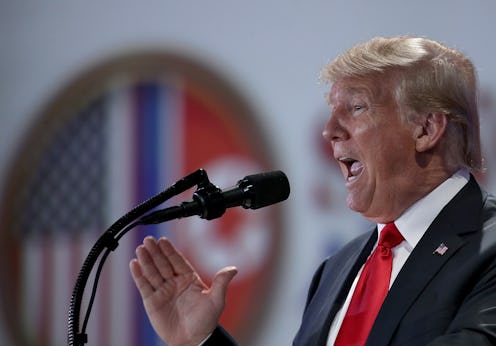
On Monday, after floating the idea several months ago, President Donald Trump ordered the creation of a so-called "Space Force." Speaking during a meeting of the National Space Council, he framed the directive as a matter of national security and identity.
"I am hereby directing the Department of Defense and Pentagon to immediately begin the process necessary to establish a Space Force as the sixth branch of the armed forces," Trump said.
He described his order as a "big statement," and said that the Space Force would differ from other branches of the military.
"We are going to have the Air Force and we are going to have the Space Force," Trump said. "Separate but equal. It is going to be something so important."
Trump first mentioned the Space Force concept on March 13, while speaking to service members at the Marine Corps Air Station Miramar in San Diego. The proposal wasn't serious at first, he said, but the more he thought of it, the more he believed it might be a good idea.
"I said, 'maybe we need a new force, we'll call it the Space Force,' and I was not really serious. Then I said, 'what a great idea,' maybe we'll have to do that," Trump said.
If the Space Force idea gets off the ground, it would be the first new military branch since the Air Force was established 71 years ago, CNBC reports. However, setting up a new branch may not receive as much support as Trump might hope, if recent history is any indication. In the past, when similar ideas have been proposed, they have faced opposition from military officials.
For example, last year, the House included a so-called "Space Corps" in its National Defense Authorization Act, though the idea was dropped before the act was finalized. It would have established the Corps within the Air Force, creating a relationship similar to that which exists between the Marine Corps and the Navy. Before it was nixed, U.S. Secretary of Defense James Mattis wrote in a letter to Rep. Mike Turner, delineating why he did not support such a proposal.
"At a time when we are trying to integrate the department's joint warfighting functions, I do not wish to add a separate service that would likely present a narrower and even parochial approach to space operations," Mattis wrote, according to ABC.
According to CNN, the White House was also not much of a fan, describing the Space Corps idea as "premature." In the interim, POLITICO reports, Congress ordered the Pentagon to investigate how the Defense Department should handle space-related endeavors. That study is still on-going, though Trump's announcement indicated that he has decided to go forward with his own idea.
"Our destiny beyond the earth is not only a matter of national identity, but a matter of national security, so important for our military and people don’t talk about it," he said during Monday's announcement. "When it comes to defending America, it is not enough to merely have an American presence in space, we must have American dominance in space."
When Trump brought up the Space Force idea in March, many on Twitter attempted to laugh him off, making Star Wars and Star Trek jokes left and right. Similar reactions abounded on Monday, though many also took a much more serious note. In particular, some users expressed frustration that Trump was focusing on expanding the military at a time when the country is facing an ongoing immigration crisis.
"The most interesting part of Trump creating a Space Force is that immigrant children are being separated from their parents and housed in cages," wrote user @isteintraum.
A firm timeline for Trump's Space Force establishment has not yet been released. Logistical details have also not been made public.